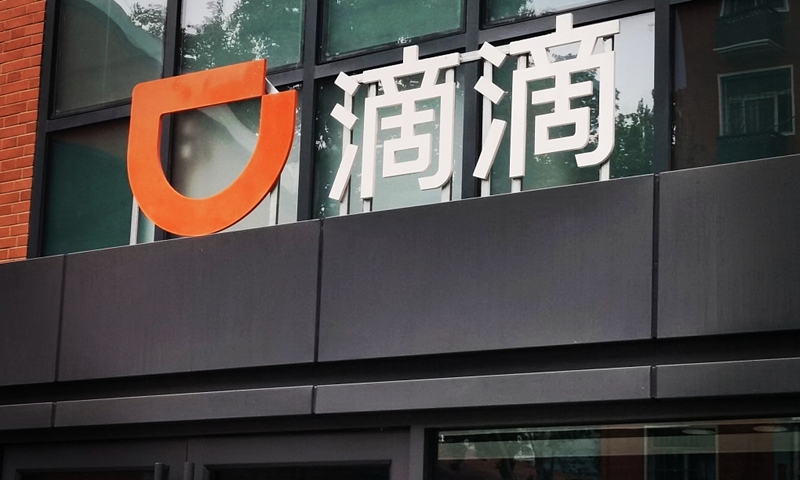
Photo: CFP
Didi Chuxing has begun the process of delisting from the New York Stock Exchange (NYSE), the Chinese ride-hailing giant announced Friday, five months after the company was slapped with a cybersecurity review by China's cyberspace regulator that overshadowed its late-June IPO.
In a post on its official Sina Weibo account, Didi said that after a careful study, it would start the process of delisting from the NYSE, effective immediately, while preparing for an IPO on the Hong Kong exchange.
Didi "will organize a shareholders meeting to vote on the above matter at an appropriate time in the future, following necessary procedures," the company said in a separate statement on its website on Friday.
Didi reportedly plans to submit its Hong Kong IPO prospectus around March 2022. The company didn't reply to a request for comment as of press time.
The delisting announcement came after a review of cybersecurity was launched into Didi in early July, only days following its NYSE IPO, as China stepped up efforts to safeguard national data security risks as part of a broader move to protect the digital economy from unchecked expansion of capital.
The Friday announcement means Didi is set to re-launch its previously suspended services, and hinted that Didi's move toward improving security and compliance might be nearing an end, Chen Liteng, an analyst at the Hangzhou-based China e-Business Research Center, said in a note sent to the Global Times on Friday.
This suggests that the regulators, while being serious, also take a tolerant approach to steer Didi into becoming a more compliant platform, Chen said,
Didi's shares closed down 0.13 percent to $7.80 on Thursday, with its year-to-date losses amounting to 44.29 percent. Its IPO was priced at $14 per share.
Didi's delisting decision is being viewed by many as a bellwether for Chinese firms in the face of domestic laws and regulations targeting cybersecurity, data security and personal information protection, which means that overseas listings of the likes of Didi have fallen out of favor, Wang Peng, an assistant professor at the Gaoling School of Artificial Intelligence at the Renmin University of China, told the Global Times on Friday.
Didi, for its part, can't meet listing requirements in the US either, according to Wang.
The Friday decision came amid regulatory toughening in the US that is seen as discouraging Chinese listings.
Chinese firms that trade on US exchanges are required to disclose their ownership structure, whether they are government-controlled or owned, and provide detailed audits, the US Securities and Exchange Commission said on Thursday.
The rule advances a process that could result in over 200 firms being kicked off US exchanges, according to Reuters.
"Chinese firms will become increasingly careful when it comes to selecting IPO destinations," Wang said, with the Hong Kong market and the STAR Market in Shanghai likely to be among the top choices for new listings.
Didi's offerings include ride services and internet data, and its US listing apparently failed to take into account China's conspicuous focus on data protection amid a global push for data sovereignty, according to Dong Yizhi, a lawyer with Shanghai-based law firm Joint-Win Partners.
There are over 150 Chinese firms traded in the US market, including internet behemoths such as Alibaba, Baidu, JD.com and Pinduoduo, which also hold large amounts of user information. These firms require a deep understanding of the country's cybersecurity and data security laws and regulations, averting possible securities risks, Dong said.
Didi's delisting decision was essentially a market-based move in accordance with changing regulatory trends in China and the US, Dong Shaopeng, an expert adviser for the China Securities Regulatory Commission, told the Global Times on Friday.
"Inevitably, those US-traded Chinese firms that have yet to join the homecoming trend will ramp up plans for secondary listings in Hong Kong, the Star Market in Shanghai and possibly the [newly launched] Beijing Stock Exchange," he told the Global Times on Friday.
Top Chinese internet firms including Baidu, Alibaba and JD.com have already joined the wave of secondary listings in Hong Kong.
There have also been market expectations for Pinduoduo to hedge a Hong Kong secondary listing.
The anticipated US IPOs of Chinese tech startups including social commerce platform Xiaohongshu, podcast platform Ximalaya, and social fitness app Keep have been suspended amid the chill.
Shortly after the probe into Didi, three other platforms found themselves in the cybersecurity crosshairs, including job recruiting platform Boss Zhipin, and Yunmanman and Huochebang - two truck-booking platforms under the Full Truck Alliance.
Kanzhun, the owner of Boss Zhipin, floated on NASDAQ on June 11, while Full Truck Alliance debuted its US IPO on June 22.
It remains unclear whether the two US-listed Chinese firms would follow Didi in removing themselves from US markets.




